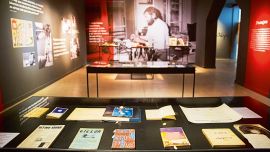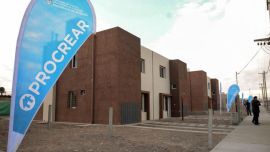Who exactly is Miguel Angel Pichetto?
For starters, he is the week’s big news spash, after President Mauricio Macri announced the senator for Río Negro would be this year’s running-mate. He is also the clearest addition yet of a Peronist wing to Cambiemos, or rather ‘Juntos por el Cambio’ (“Together for the Change”) as the alliance will be known from now on.
Until this week, the Peronist veteran had been an Alternativa Federal (“Federal Alternative”) presidential hopeful proposing a “third way” between Macri and his predecessor Cristina Fernández de Kirchner, in alliance with governors Juan Manuel Urtubey (Salta) and Juan Schiaretti (Córdoba) and Renewal Front leader Sergio Massa. However, all four have since dropped out one way or another.
Pichetto’s response to the presidential invitation was an “immediate yes,” he told a press conference on Tuesday.
This latest move came as a surprise but nonetheless it is entirely consistent with his track record during a quartercentury in Congress – loyal service to Presidents Carlos Menem, Eduardo Duhalde, Néstor Kirchner and even his widow Cristina (until shortly after she ceased being president) and now Macri. Almost the only time Pichetto distanced himself from the presidency was during the years of the Radical-led Alliance (1999-2001) when then-Buenos Aires Province Peronist governor Carlos Ruckauf was his main political touchstone.
EARLY DAYS
Banfield-born in 1950, Pichetto grew up in Greater Buenos Aires, graduating in law from La Plata University in 1976. His reaction to the military coup of that year was similar to the Kirchner couple (also La Plata law graduates), fleeing south to Patagonia – Río Negro in his case where he practised law privately during the dictatorship years (also like the Kirchners).
The return of democracy in 1983 saw him enter politics immediately, always as a Peronist – working his way upwards from municipal council (1983- 7 and Mayor of Sierra Grande from 1985) to provincial assembly (1987-93) and finally national level, entering Congress in 1993.
He served two terms in the Lower House, during the second of which he was the deputy whip of the Justicialist caucus under Diego Ibañez. In 2001 he graduated to the Senate where he was now approaching the end of his third term with no hope of a fourth.
As from 2003 Pichetto served the Kirchners zealously in the Senate as Majority Leader, steering much of their legislation through the Upper House (with a memorably agonised expression on his face when the farm export duties bill of 2008 was torpedoed by then vice-president Julio Cobos).
The Kirchners, however, only returned these services with lukewarm support for his Río Negro gubernatorial ambitions in both 2007 and 2011.
ESTRANGEMENT
The estrangement was already beginning in Fernández de Kirchner’s second term although the formal break did not come until the 2017 midterms when Pichetto split the Justicialist caucus to form Argentina Federal with anti-Kirchnerite Peronist senators (who initially trebled the Victory Front in size), favouring dialogue with the Macri administration.
With ties cut, since then the only favour he has done the expresident has been to defend her parliamentary immunity and thus keep her out of prison in the several corruption trials she now faces.
During the Macri administration years, Pichetto has helped to steer some of his most controversial legislation through Congress, including the debt settlement with the socalled ‘vulture’ fund holdouts and the pension reform in late 2017. The senator has also been a good friend of provincial governors, using his friendship with Interior Minister Rogelio Frigerio to tweak federal revenue-sharing arrangements in their favour.
CONTROVERSY
But one less amiable aspect of Pichetto has been his chronic xenophobia. Argentina has become a dumping-ground for the impoverished of Bolivia and the criminals of Peru , he once charged – “We solve the problems of those countries by Argentina taking in all that garbage with no control of immigration.”
He was also accused of being misogynistic in the pension reform debate when he supported postponing retirement while adding: “The place of the woman is in the house, better leave her out of this,” although he backed last year’s divisive abortion bill.
Another lapse into the politically incorrect came during the 2013 debate on the Memorandum of Understanding with Iran, when Pichetto referred to the victims of the 1985 terrorist bomb-blast as “Argentines of the Jewish religion and Argentine Argentines,” a discriminatory phrase for which he felt obliged to apologise. His strong support for mining has also antagonised environmental activists.
He is married to María Teresa
Minassian with two children,
Carolina and Juan Manuel.related news

















Comments